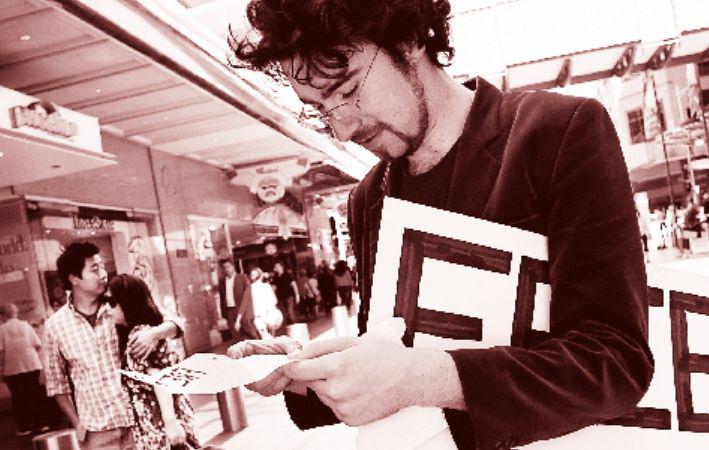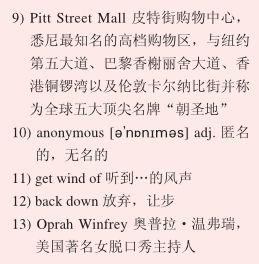追踪揭秘:“抱抱团”轶事记
The man in front of me has fear in his eyes. It is the evening rush hour in London and I am standing in the middle of 1)Carnaby Street holding aloft a 2)placard that reads: “Free Hugs”. My mission is simply to reach out to strangers, clasp them close and make them feel better about their day—3)no strings attached. But this man isnt convinced. “What are you selling?” he asks.“Nothing,” I explain. “Were just offering hugs to people. For free.”
我面前的那个男人目露恐惧。那是伦敦傍晚的上下班高峰期,我高举写着“自由拥抱”的标语牌,站在卡尔纳比街中央。我的目的很简单,那就是向陌生人张开双臂,紧紧抱住他们,让他们心情更好——不求任何回报。但是,这个男人并不相信。“你在卖什么?”他问。“不卖什么,”我解释道。“我们只是给人们提供拥抱。免费的。”
The man slips his iPhone out of his jacket pocket and takes a photo, as if he cannot quite believe what he is seeing. I open my arms in what I hope is a welcoming, earth-motherly fashion. I remember what Ive been told in the pre-hugs briefing by the group co-ordinator: smile, but not so much that you look psychotic, and dont take offence if someone doesnt want to hug you back. I wait. The man looks uneasy, a bit embarrassed and then, unexpectedly, his face breaks into a smile.
He hugs me. And although Ive been secretly 4)dreading the moment when Ill have to engage in a surprisingly intimate act with a stranger who might have all manner of personal 5)hygiene problems, I discover that its a nice feeling. We hold each other for a moment, then release. We exchange smiles and I watch as he makes his way back down the street.
The story of how I got to be here, pressing flesh with random pedestrians, is an 6)intriguing one.
In June 2004, an Australian who went by the 7)pseudonym Juan Mann started giving out free hugs in his local shopping mall. Mann had reached a point of personal crisis in his own life: his parents had divorced and his fiancée had broken off their engagement. He realised that people were living increasingly disconnected lives. The need for human contact had been neglected. In Manns eyes, we were living in a computer-mediated culture where friends were made through MySpace and families were breaking down. Where previously small-scale local communities had been integral to individual wellbeing, now people were pursuing 8)far-flung separate lives in different corners of the globe.
那男人从他的夹克口袋里掏出苹果手机,拍了张照,好像不太能相信他眼前所见。我张开了双臂,以一种自己希望是热情的,犹如大地之母般慈爱的方式。我记得活动简介会上,团队协调员简要地提醒过:微笑,但别太过,以免让自己看上去像神经病,如果别人不想还你一抱,也别动怒。我等待着。那男人看起来不大自在,有一点尴尬,接着,出乎意料地,他的脸上绽开了笑容。
他拥抱了我。虽然我一直暗地里担心这时刻,因为得和各色各样或许有卫生问题的陌生人进行意外亲密的接触,但是我发现那感觉很棒。好一会儿,我们拥抱着彼此,然后放开。我们相视而笑,而后我看着他走回街上。
我是如何开始在这儿与来往的行人拥抱的?这是个挺有意思的故事。
2004年6月,一位化名胡安·曼恩的澳洲男子开始在他当地的购物中心献出自由拥抱。曼恩自己的生活曾一度遭遇个人危机:父母离异,未婚妻也解除了他们的婚约。他意识到人们正过着越来越疏离的生活。人际交往的需要已经被忽略。在曼恩看来,人们处在一种电脑操控的文化之中,在这种文化中,我们通过聚友网交朋友,家庭则支离破碎。以前,个人福祉离不开小型的本地社群,而如今人们追求的是在地球上的不同角落、天各一方的独居生活。
Mann hand-wrote a sign advertising Free Hugs and went to the 9)Pitt Street Mall in central Sydney, where he stood for 15 long, lonely minutes before an elderly lady took pity on him. Her dog had just died, she confessed, and the hug had made her feel better. Soon Juan Mann was handing out hugs every few seconds. As the days passed, more volunteers with their own handwritten signs came and stood alongside him. Shimon Moore was one of them.
“I had a job holding a sign advertising a sale on shoes,” Moore says, speaking to me from his home in Los Angeles. “I saw this guy offering free hugs one day. I thought it was a great idea, so I started talking to him.” Moore wrote songs in his spare time and was the lead singer for a band called Sick Puppies. The band was looking for a record deal, so Moore took his fathers video camera to the mall and started to film Juan Mann with the idea of making a music video. Free Hugs had started taking off: every day, hundreds of shoppers would stop to be hugged by the 10)anonymous man with the home-made placard. By October the police had 11)got wind of it and threatened to ban the movement. Ten thousand people signed a petition. The police 12)backed down.
曼恩手制了一个标示牌宣传“自由拥抱”,而后去了位于悉尼市中心的皮特街购物中心,在那儿孤零零地站了长达15分钟之后,才有一位上了年纪的女士可怜他,给了他一个拥抱。她直言不讳地说道,她的狗刚刚离世,这个拥抱让她感觉好多了。不一会儿,曼恩每隔几秒就给予路人一个拥抱。随着日子一天天过去,越来越多的志愿者带着他们自己手写的标示牌赶来并加入曼恩的行列。西蒙·莫尔便是其中之一。
“我曾经有份工作就是举广告牌为鞋子作销售宣传,”莫尔在其洛杉矶的家里对我说道。“有一天我看到这个家伙提供自由拥抱。我觉得那是个很棒的主意,于是我就和他聊了起来。”莫尔闲暇的时候会写歌,而且他是乐队“生病狗狗”的主唱。当时这支乐队正在寻求一张唱片合约,所以莫尔就带着他父亲的摄影机去了那家购物中心,并开始为胡安·曼恩拍摄,想就此制作一个音乐视频。“自由拥抱”活动逐渐声名四起:每天,数以百计的购物者会停下脚步和这个拿着自制标语牌的无名男子拥抱。到了10月,警方听闻此事,扬言要禁止这个活动。万人签名请愿表示支持曼恩,于是警方作出让步。
Moore filmed it all. When he and his band, Sick Puppies, moved to Los Angeles in March 2005 in search of a record deal, he edited the footage, set it to music and sent it back to Mann in Sydney as a present. Mann posted the video on YouTube and it went viral, attracting 70,000,000 views. The YouTube video made Juan Mann into something of a celebrity and his campaign attracted global media coverage. By 2006 he was being interviewed by 13)Oprah Winfrey and Free Hugs was going international: branches sprang up in Taiwan, Israel, Italy, America, Switzerland,Norway, India, Portugal and the UK. Moore and his band got a record deal. They started selling Free Hugs merchandise at their gigs—T-shirts and mugs emblazoned with Juan Manns distinctive handwriting. Mann wrote a book—The Illustrated Guide to Free Hugs—became an after-dinner speaker and published his address and mobile-phone number online, offering to go for a meal with anyone who contacted him. For a while, everything was good.
But then it all went quiet. When I attempt to get in touch with Juan Mann, he seems to have disappeared. Eventually I track down a brief interview Mann gave to a New York business news website in 2010 in which he claimed Shimon Moore had screwed him over financially by getting him to sign up with the same management company that represented Sick Puppies.
“I complied, believing that Shimon, as my friend, would make certain that we were both amply compensated for the video and the Free Hugs merchandise the band sells,” Mann said. But according to Mann, that didnt happen: he claimed all the earnings went straight to Moore and his band members.
莫尔把这些都拍了下来。为了能拿到唱片合约,2005年3月,莫尔和他的 “生病狗狗”乐队去了洛杉矶,他剪辑了视频,配好音乐并把它作为礼物寄回给身在悉尼的曼恩。曼恩把视频放到了YouTube上,随即在网上迅速散播,引来7000万的点击率。这段视频让胡安·曼恩成了名人,他的自由拥抱运动吸引了全球媒体的竞相报道。2006年,他接受了奥普拉·温弗瑞的采访,“自由拥抱”运动也走向世界:在中国台湾、以色列、意大利、美国、瑞士、挪威、印度、葡萄牙以及英国,自由拥抱运动的分支如雨后春笋般涌现。莫尔和他的乐队拿到了唱片合约。他们开始在演奏会上贩卖自由拥抱运动的商品——印有胡安·曼恩特制签名的T恤和马克杯。曼恩写了一本书——《自由拥抱图解指南》——他成了人们茶余饭后的谈资,他还把地址和手机号码发到了网上,邀请与他联系的任何人一同吃饭。那段时间,一切都很好。
但此后一切归于平静。当我试图联系胡安·曼恩时,他似乎从人间蒸发了。最终,我在一个纽约商业新闻网上找到了曼恩在2010年接受的一段简短采访,采访中他声称西蒙·莫尔让他与“生病狗狗”乐队的经纪公司签约,西蒙在金钱上欺骗了他。
“我答应了,因为作为朋友,我信任西蒙,一定会就视频和乐队出售的‘自由拥抱主题商品与我分享销售所得,”曼恩说道。按照曼恩的说法,那并未发生:曼恩称,所有的盈利都进了摩尔和“生病狗狗”乐队成员的腰包。
When I speak to Moore, he is clearly uncomfortable. “Thats a 14)touchy subject,” he says over the phone. “I havent commented before because I dont want to fuck up the brand. The truth is, we had a falling-out over money…it messed up our friendship.”
Moore seems genuinely distressed about the falling-out. He loved Free Hugs.
“ It was Juans thing: he made it, he started it.” He sighs. “But the beautiful thing now is that its so much bigger than any one person.” He sounds as if he is trying to persuade himself. And yet it is true that the concept of Free Hugs has been extremely influential. People still stand on busy streets holding placards in much the same way as Juan Mann did all those years ago.
For years we worshipped at the 15)altar of conspicuous consumption in an age when fame was accorded for marrying a footballer or appearing on reality television, and when friendships were made and lost at the click of a computer mouse. These days we take more delight in the everyday kindnesses, in the shared experience.
Back on Carnaby Street, my efforts to mix my emotions with complete strangers are gathering pace. As Im standing there, handing out hugs to people Ive never met before and will probably never meet again, it strikes me that theres an obvious irony in the fact that a movement predicated on free gestures of intimacy should have been 16)riven by in-fighting about money between the two men who made it happen. But maybe it doesnt matter. Like most of the best ideas, Free Hugs has gathered its own momentum. After all, it was always meant to be bigger than just Juan Mann.
我向摩尔谈及此事,他明显不大自然。“这是个敏感的话题,”他在电话中说道。“之前我没有就此事发表言论,是因为我不想搞砸招牌。事实是,我们因为钱闹掰了……金钱搞砸了我们的友谊。”
对于和胡安的决裂,摩尔看起来真的很痛苦。他热爱“自由拥抱”运动。
“‘自由拥抱运动是胡安的东西:他是创始人、发起者。”他叹了口气。“但现在美妙的是它声势越来越浩大,已不再局限于任何个人。”他的话听起来像是在试着说服自己。然而这是事实:自由拥抱的概念已经极具影响力。如同多年前胡安·曼恩那样,人们仍旧举着标语牌,站在人来人往的街道上。
多年来我们对斗富摆阔顶礼膜拜,在这个时代,人们靠嫁给足球运动员或上真人秀电视节目来博得声名,人们敲一下电脑鼠标,就能得到或失去友谊。这些日子以来,我们从每日的善举和经验分享中,获得了更多快乐。
回到卡尔纳比街,我加倍努力将自己的情感与陌生人融合。当我站在这里,拥抱与我素不相识,而且可能再也不会遇见的人,我突然觉得事实很讽刺:这项建基于免费亲密善举的运动竟然会因为两位创始人之间的金钱纠纷而分崩离析。但也许这并不打紧。如同很多好点子一样,“自由拥抱”运动势头正健。毕竟,本就该有更多人参与,而不仅仅限于胡安·曼恩。
——访曼恩商用车亚太区首席执行官、中国区总裁哈特(Thilo Halter)

